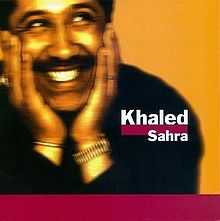Sahra
From Wikipedia, the free encyclopedia
For the village in Iran, see Sahra, Iran. For the administrative subdivision of Iran, see Sahra Rural District. For SAHRA South Africa, see South African Heritage Resources Agency . For other uses, see Zahra (disambiguation).
| Sahra | ||||
|---|---|---|---|---|
 | ||||
| Studio album by Khaled | ||||
| Released | November 8, 1996 | |||
| Recorded |
* Studio Zorrino, Paris * Grove Yard Studio, Ocho Rios * Studio Davout, Paris * Ocean Way, Hollywood * Chomsky Ranch, Los Angeles * Artistic Palace, Paris | |||
| Genre | Raï | |||
| Length | 51:47 | |||
| Label |
Barclay/PolyGram Records (Europe) Mango/Island/PolyGram Records (U.S.) | |||
| Producer | Don Was, Philippe Eidel, Jean-Jacques Goldman and Clive Hunt | |||
| Khaled chronology | ||||
| ||||
| Professional ratings | |
|---|---|
| Review scores | |
| Source | Rating |
| Allmusic | |
Sahra is a studio album from Algerian raï artist Khaled, released in 1996. It was the artist's biggest production to date, being co-produced by Philippe Eidel, Don Was, Jean-Jacques Goldman and Clive Hunt, and including performances by many other singers from around the world. It features what is perhaps Khaled's most popular song, "Aïcha". Most tracks are sung in Arabic, with a notable dosage of French. The title track is named after Khaled's first daughter, Sarah, to whom the album is dedicated along with her mother, Samira.
The album was certified platinum certification by Syndicat National de l'Edition Phonographique.[2]
The album was re-released by Wrasse Records in the US & UK in 2005.
Track listing
- "Sahra" – 4:12
- "Oran Marseille (Oran mix)" – 5:08
- "Aïcha" – 4:19
- "Lillah" – 4:24
- "Ouelli El Darek" (with the I Threes) – 3:11
- "Detni Essekra" – 4:58
- "Walou Walou" – 4:17
- "Ki Kounti" (with Saúl Hernández) – 4:40
- "Wahrane Wahrane" – 4:40
- "Haya Haya" – 4:37
- "Mektoubi" – 3:55
- "Hey Ouedi" – 4:12
- "Oran Marseille" (with Akhenaton and Shurik'n of IAM) – 4:25
- "Sratli" – 4:36
- "Le jour viendra" – 4:42
- "Didi (BBB Radio Edit" - 3:14 (bonus track on 1997 European re-issue)[3]
References
- ↑ Allmusic review
- ↑ Syndicat National de l'Edition Phonographique gold certified albums for the year 1997
- ↑ http://www.discogs.com/Khaled-Sahra/release/2858314
This article is issued from Wikipedia. The text is available under the Creative Commons Attribution/Share Alike; additional terms may apply for the media files.